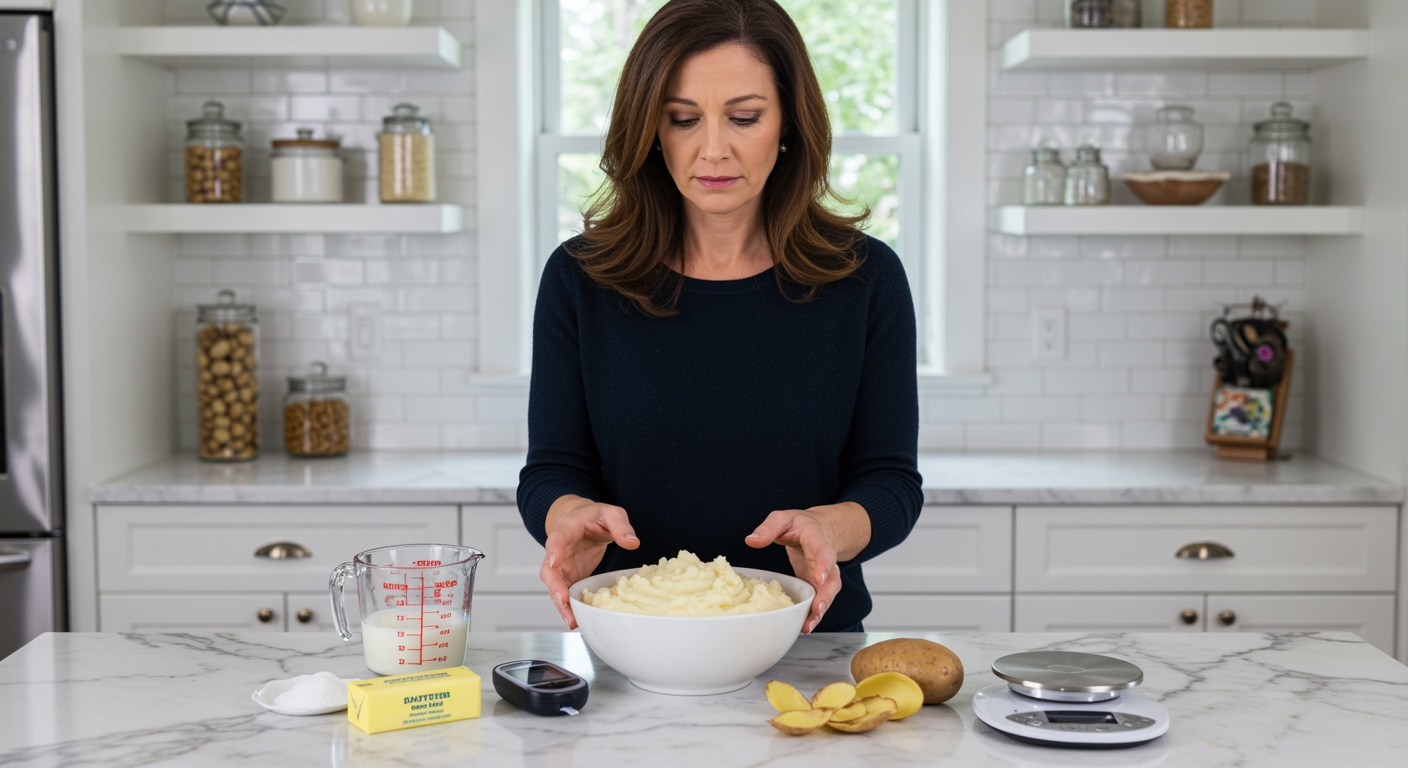✪ Key Takeaway: Mashed potatoes are not ideal for diabetes due to their high glycemic index of 87, but portion control and preparation methods can help.
Introduction
Your favorite comfort food might be sabotaging your blood sugar without you knowing it.
Many people with diabetes wonder if they can still enjoy mashed potatoes as part of their meal plan, especially during family gatherings and holiday celebrations.
Hi, I am Abdur, your nutrition coach and today I am going to explain exactly how mashed potatoes affect your blood sugar and what you can do to make smarter choices.
How Do Mashed Potatoes Affect Blood Sugar?
Mashed potatoes have a glycemic index of 87, which puts them in the high category for blood sugar impact.
This means they cause your blood glucose to rise faster and higher than many other foods.
The mashing process breaks down the potato structure, making the starches more accessible to your digestive enzymes.
When you eat mashed potatoes, your body converts the starches into glucose very quickly.
This rapid conversion leads to a blood sugar spike within 30 to 60 minutes after eating.
Research shows that potatoes can increase diabetes risk by 14% when consumed regularly in large amounts.
The preparation method matters significantly because mashing removes the fiber structure that would normally slow down digestion.
✪ Fact: Mashed potatoes have a higher glycemic index than white bread or even pure glucose tablets.
What Makes Mashed Potatoes Worse For Diabetes?
The ingredients you add to mashed potatoes can make them even more problematic for blood sugar control.
Butter and cream add saturated fats that can worsen insulin resistance over time.
Many people add milk, which contains lactose, a natural sugar that contributes additional carbohydrates to the dish.
The smooth texture of mashed potatoes means your stomach empties them faster than whole potatoes.
This faster gastric emptying leads to quicker absorption and higher blood sugar peaks.
Restaurant and packaged mashed potatoes often contain added sugars and preservatives that further increase their glycemic impact.
The typical serving size of mashed potatoes is also larger than what most people with diabetes should consume in one meal.
✪ Pro Tip: Check ingredient labels on instant mashed potato mixes as they often contain hidden sugars and high sodium.
Can You Make Mashed Potatoes Diabetes-Friendly?
You can reduce the blood sugar impact of mashed potatoes with smart preparation techniques.
Portion control is your first line of defense against blood sugar spikes.
Limit your serving to half a cup, which contains about 15 grams of carbohydrates.
Mix mashed potatoes with cauliflower to reduce the overall carbohydrate content while maintaining creamy texture.
Use low-fat milk or unsweetened almond milk instead of cream and butter to reduce saturated fat.
Add fiber-rich vegetables like roasted garlic or herbs to slow down digestion.
Eat mashed potatoes as part of a balanced meal with protein and healthy fats to minimize blood sugar impact.
✪ Note: Cooling mashed potatoes and reheating them creates resistant starch that has less impact on blood sugar.
What Are Better Alternatives To Mashed Potatoes?
Several alternatives can satisfy your craving for creamy, comforting side dishes without spiking blood sugar.
Mashed cauliflower provides similar texture with only 5 grams of carbs per cup compared to 35 grams in mashed potatoes.
Mashed turnips offer a slightly sweet flavor with significantly fewer carbohydrates than potatoes.
Mashed parsnips provide natural sweetness and fiber while having a lower glycemic impact.
You can create a blend of half potatoes and half cauliflower to gradually transition your taste preferences.
Roasted and mashed sweet potatoes with skin provide more fiber and nutrients than regular mashed potatoes.
These alternatives allow you to enjoy comfort food textures while maintaining better blood sugar control throughout your day.
✪ Pro Tip: Season alternative mashes with garlic powder, herbs, and a small amount of olive oil for maximum flavor satisfaction.
The Bottom Line
Mashed potatoes are not the best choice for people with diabetes due to their high glycemic index and rapid blood sugar impact.
Smart food choices today create healthier tomorrows, one meal at a time.
I would love to hear about your experiences with managing blood sugar and comfort foods, so please share your questions or feedback in the comments below.
References
At NutritionCrown, we use quality and credible sources to ensure our content is accurate and trustworthy. Below are the sources referenced in creating this article:
- January AI: Mashed Potatoes Glycemic Index
- Harvard School of Public Health: Potatoes May Increase Risk of Type 2 Diabetes
- PubMed: Potato Consumption and Risk of Type 2 Diabetes
- WebMD: Carbs, Potatoes, and Blood Sugar





